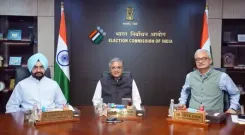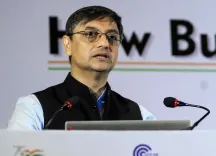Should the Youth of Bengal Look to Nepal for Inspiration?

Synopsis
Key Takeaways
- Youth activism is vital in combating corruption.
- Social media freedom is crucial for free expression.
- Political engagement can lead to significant change.
- Community solidarity amplifies voices for justice.
- Lessons from international movements can inspire local action.
New Delhi, Sep 9 (NationPress) In light of the ongoing political turmoil in Nepal driven by the fervent protests of Gen Z, BJP leader Arjun Singh commended the youth of Nepal for their courageous stance against corruption. He called on the youth of West Bengal to draw motivation from their example.
In response to the Nepalese government’s recent decision to lift a contentious social media ban following widespread protests, Singh stated, “The citizens of Nepal, who are part of our community, have boldly voiced their opposition and initiated a campaign against corruption. I commend the young people between 18 and 30 and encourage the youth of Bengal to take a page from their book.”
He further emphasized, “Despite rampant corruption, the citizens of Bengal are still awaiting action from the nation’s Prime Minister. Opportunities for employment are scarce, security is lacking, and the safety of women is compromised. When will you rise up?”
Singh urged the youth of Bengal to “step forward and vocalize their concerns over the declining law and order situation in West Bengal.”
His remarks coincide with escalating protests in Nepal, which erupted in response to the government’s prohibition of 26 social media and messaging applications, including Facebook, Instagram, and WhatsApp.
The ban was initially presented as a regulatory measure but was widely viewed as an infringement on free speech and digital liberties.
On Monday, thousands of Gen Z protesters took to the streets of Kathmandu, invading government buildings and clashing with law enforcement. Security forces reacted with live ammunition, rubber bullets, and tear gas, leading to at least 19 reported fatalities, as per local media.
Following these events, Home Minister Ramesh Lekhak resigned, and the government lifted the social media ban without a formal announcement.
Additionally, another minister from Prime Minister K.P. Sharma Oli’s Cabinet resigned on Tuesday, denouncing the state’s violent response to peaceful protesters.
A curfew has been reinstated in several areas of the Kathmandu Valley amid concerns of further unrest, even as smaller protests persist across the nation.








